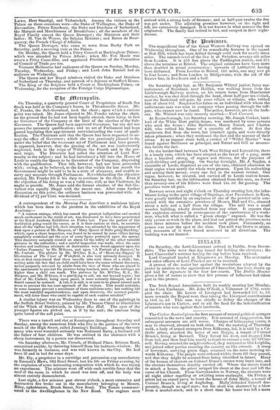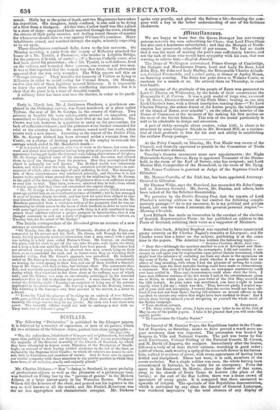IRELAND.
On Saturday, the Lord-Lieutenant arrived in Dublin, from Devon- shire. The writs were that day issued for holding the elections ; the Lord Chancellor's warrant having the day before been received.
Lord Campbell landed at Kingstown on Monday. The secretaries and other officers of Lord Plunket are to be retained.
A protest of the senior bar against the resolutions adopted by the junior in relation to the appointment of Chancellor, has been drawn up and laid for signature in the four law-courts. The Dublin Monitor gives a list of names to show that few persons of influence had taken part in this protest.
The Irish Repeal Association held its weekly meeting last Monday, at the Corn Exchange. Mr. John O'Neill, a Volunteer of 1782, occu- pied the chair. Mr. Lenon of Liverpool had forwarded 25/. 4s. 5d. more towards the Repeal rent, thus raising the Liverpool contributions to 180/. Sr. 2d. This sum was chiefly to defray the charges of the Liberator's son in Carlow, and to aid the fund for the indemnification of tenants who vote against their landlords.
The Carlow Sentinel gives the first account of several political outrages committed in the town and country. It is accused of exaggeration, but subsequent accounts are still worse. Charges of kidnapping voters, it may be observed, abound on both sides. On the morning of Thursday week, a body of armed strangers from Kilkenny, led, it is said by a Ca- tholic priest, attacked the house of one Bergin, a tenant of Colonel Bruen's, living at Bawnell. They forced his door, and dragged him from bed, and then beat him nearly to death to extract a vote for O'Con- nell. Having aroused the neighbourhood, they retreated to Old Leighlin, and joined other parties scouring the country on like errands. A troop of horseman, carrying green flags, returned on the same morning to- wards Kilkenny. The people were ordered within doors till they passed, and that they might be secured from being identified in future. Many of the houses of electors on Colonel Bruen's estates were burst into, and the electors themselves forcibly carried off. Where the rioters feared to attack a house, the priest scraped his shoes at the door and left the curse of his Church. From Garryhunden to Nurney, the electors were all night either repelling or awaiting some onslaught. On Friday, a priest led an armed party to beset the house of John Melly, a tenant of Colonel Bruen's, living at Aughabeg. Nally:defended himself des- perately, though an aged man ; but his skull was shattered by a blow from a musket-stock, and in a short time his house was left a mere
wreck. Many lay at the point of death, and two Magistrates have taken Ins deposition. His daughter, lately confined, is also said to be dying of a blow from a bludgeon. All this time, Carlow itself was like a place in a state of siege : organized bands marched through the town, clearing the streets of their party enemies, and dealing round threats of murder for whosoever should dare to vote against O'Connell's nominee. Many inhabitants armed, and watched through the night, minutely expecting to be set upon.
• These disturbances continued daily, down to the last accounts. On Monday mornine, a party from the county of Kilkenny attacked the house of a Mr. Tyndal, a Protestant, who resides in Leighlin Bridge, for the purpose, it is said, of carrying off a Roman Catholic voter, who lad been under his protection ; when Mr. Tyndal, in self-defence, fired on the ruffians, and wounded three persons, one woman and two men. It was at first reported that the woman was shot dead; but it afterwards appeared that she was only wounded. The Whig papers call this an "Orange outrage." They describe the tenantry of Carlow as flying to Kilkenny in order to avoid voting for Colonel Bruen. On Monday, twelve cars full of these fugitives entered Kilkenny. It is impossible to learn the exact truth from these conflicting statements ; but it is clear that the place is in a state of dreadful tumult. A military force has been sent into the district, in order to its pacifi- cation.
Early in March last, Mr. J. Jenkinsort Heathers, a gentleman em- ployed in the Ordnance survey, was found murdered, at a place called Tyrone, the seat of Mr. St. George, in the county of Galway. Two persons in humble life were subsequently arrested on suspicion, and committed to Galway Gaol to abide their trial at the last Assizes. The Crown was not, however, in a position to carry on the prosecution, for lack of sufficient evidence ; and the prisoners were further remanded for trial at the ensuing Assizes. So matters rested until last week, when
events took a new aspect. According to the report of the Dublin Pilot, Mr. St. George himself has been arrested under a warrant from the Castle, on a charge of inciting persons in his employ to commit the outrage which ended in Mr. Heathers's death— "it is reported that a painter, who was at work in the house, has come for- ward and stated that information having been given of a person of a suspicious appearance having got inside the demesne-wall, taking observations of the place,
Mr. St. George supplied some of his attendants with fire-arms, and ordered them to eject the stranger from the premises. How they accomplished that object is unhappily too well known. The ill-fated youth was inhumanly
beaten, and thrown over the wall, having sustained several fractures ; in con- sequence of which, after some days of great suffering, he died. The investiga-
tion of these circumstances was conducted privately, and therefore it is not known to the public what ground there may be for implicating Mr. St. George in the guilt of the transaction ; but the Magistrates have seen sufficient reason to send him to triaL They have, however, admitted him to bail; from which it would appear that they have not entertained the capital charge.
" Mr. St. George is the proprietor of an extensive estate, which not many years ago yielded him an unencumbered revenue of 10,000/. ; but he has managed
it so as to become deeply involved, and has been for some time obliged to con-
ceal himself from the retainers of the law. The murderous assault on the Mr. Heathers proceeded from a mistaken notion of the peasantry that he was en- deavouring to obtain access to the house of their landlord, in order to serve him with some legal process : and so dangerousta thing is it still considered to ap- proach those confines without a proper passport or introduction, that it was thought necessary to call out a party of dragoons to execute the warrant, on Tuesday last, for the arrest of Mr. George."
The Dublin correspondent of the Standard gives an account of a new attempt at assassination— "On Monday last, Mr. G. Garvey, of Thomvale, Justice of the Peace, ac- companied by his servant and his clerk, Mr. Green, left Nenagh for his own
house, having previously received information that a man armed with a pistol
was lurking in a field near, called Breton's Cross. Mr. Garvey, on reaching this place, told his clerk to get off the car, take his gun, walk inside the ditch, and a keep a look-out until the field should have been passed. The former had not advanced many yards, when he observed two men armed, lying on their faces, so as to command the road, and so intent were they on watching their intended victim, that Mr. Green's approach was unnoticed. He instantly called on Mr. Garvey to stop, as he valued his life. The assassins, immediately on hearing the voice, sprung to their feet, and one of them levelled a blunder- buss at Mr. Green, who fired at him, but without effect. The miscreants then fled; and were hotly pursued through three fields by Mr. Garvey and his clerk, during which they contrived to fire three shots at the ruffians, none of which told; and Mr. Garvey was soon so considerably outstripped by his intended murderers that he had to abandon the pursuit. A man named Ryan was ar- rested the following night (Tuesday) on suspicion of being one of the persons implicated in the above outrage. Mr. Garvey is agent to the Norbury estates. The following is Mr. Garvey's own brief account of the matter, in a letter to a friend.
Yesterday I had the pleasure of breaking up an ambush of two fellows, with guns pointed at me through a hedge. I got three shots at them—unfor- tunately the range was too long for my pistols. My clerk and I ran them into cover. The cowardly villains would not wait to exchange a shot with us. They were two of Gleeson's gang."



























 Previous page
Previous page